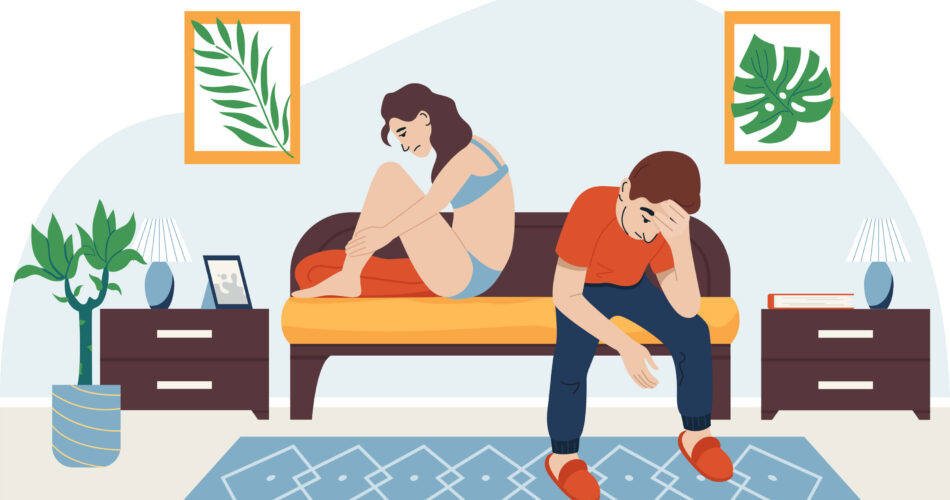In recent years, there has been increasing interest in exploring the connection between pornography and depression. While the topic remains controversial, numerous studies have shed light on the potential link between the two.
In this blog, we’ll delve more into their connection, and analyze if there are triggering factors that lead to an increase in depression cases. By understanding this relationship, it can provide valuable insights into the impact of pornography consumption on mental health and well-being. Let’s uncover everything today!
The Evolution of Pornography

Pornography can be defined as sexually explicit material that is intended to sexually arouse the viewer. It encompasses a wide range of media, including magazines, videos, websites, and digital content. Over the years, pornography has evolved significantly, largely due to advances in technology and the widespread availability of internet access.
This type of material has been present throughout human history. From ancient erotic art to explicit literature, it has always been a part of human expression. However, with the advent of the internet, pornography has become more accessible and prevalent than ever before. The ease of access and anonymity afforded by online platforms have contributed to its widespread consumption.
The Role of the Internet in the Spread of Pornography
One of the major platforms that made this type of material freely available to everyone is the internet. This technological advancement had revolutionized the pornography industry, making explicit content available to anyone with an internet connection. With just a few clicks, individuals can access a vast array of explicit material, catering to various preferences.
Furthermore, the internet has also given rise to a new form of pornography: amateur content. With the availability of affordable recording equipment and online platforms, individuals can now create and share their own explicit material. This democratization of pornography has led to a diverse range of content, reflecting the varied desires and fantasies of individuals.
In addition to the proliferation of amateur content, the internet has also facilitated the growth of niche pornography. In the past, individuals with specific fetishes or preferences may have struggled to find material that catered to their desires. However, with the internet, niche communities have formed, allowing individuals to connect and share explicit content that aligns with their specific interests. This has created a more inclusive and diverse landscape within the pornography industry.
The Psychology of Depression

Depression is a mental health disorder that affects millions of people worldwide. It is characterized by persistent feelings of sadness, and noticeable changes in the daily activities. Most patients with this condition are also described to have concentration difficulties and affected overall well being.
With this kind of situation, it’s no wonder why many correlates it with pornography. Let’s explore more about depression and pornography, specifically its potential relationship.
The Common Causes of Depression
When it comes to the triggering factors of depression, it can always vary. In most cases, depression can arise from a combination of factors and causes. Some examples may involve the following:
- genetic
- biological
- environmental
- psychological
Other Factors Causing Depression
While those are the most common causes, there are still other factors that may also influence the patient’s mental health. For instance, traumatic life events, such as the loss of a loved one or a history of abuse, can contribute to the development of depression.
Furthermore, chronic illnesses, such as diabetes or heart disease, can also increase the risk of experiencing depressive symptoms. In short, conflicts may cause social isolation, feelings of sadness and despair, anxiety attack and other depressive symptoms can affect the patient’s mental health. Thus, leading to depression.
Aside from that, chemical imbalances in the brain, specifically involving neurotransmitters like serotonin and norepinephrine, have also been linked to depression. These imbalances can disrupt the brain’s communication system, affecting mood regulation and leading to depressive symptoms. It is important to note that depression is a complex condition with multifaceted causes, and each individual’s experience may be unique.
The Correlation Between Pornography and Depression
While the exact nature of the relationship between pornography and depression remains a subject of debate, studies have suggested a potential link. Understanding the impact of pornography on mental health can help individuals make informed choices about their consumption habits and seek appropriate support when necessary.
The Impact of Pornography on Mental Health

Research suggests that excessive pornography consumption may have adverse effects on mental health. Individuals who consume large amounts of explicit material may experience decreased life satisfaction, relationship dissatisfaction, and increased symptoms of anxiety and depression. However, it is essential to recognize that causality cannot be definitively established, and other factors may contribute to these outcomes.
On the other hand, some studies have indicated that exposure to explicit material may contribute to the development of depressive symptoms. The unrealistic portrayal of sexual encounters and body images in pornography can lead to feelings of inadequacy and dissatisfaction. Additionally, excessive consumption may disrupt normal sexual functioning and intimacy, potentially impacting mental well-being.
This connection can lead to a disruption of preferences, which can affect the satisfaction and comfort of individuals. With the unrealistic standard that pornography provides, it can promote pressure and unnecessary negative feeling towards themselves. Thus, the beginning of continuous discontentment and depressive state.
The Science Behind the Link
Aside from the impact of being exposed to pornography, there are also aspects that needs to be discussed. That includes the neurological and psychological effects of pornography consumption. These aspects can help shed light on the potential link between pornography and depression. Research in this area is still relatively limited, but early findings provide valuable insights into the mechanisms that may be at play.
The Neurological Effects of Pornography
Neurological studies suggest that repeated exposure to explicit material can lead to changes in the brain’s reward circuitry. Dopamine, a neurotransmitter associated with pleasure and reward, is released in response to sexual stimuli. Over time, excessive exposure to pornography can lead to desensitization, requiring stronger stimuli to achieve the same level of arousal. This can potentially impact overall well-being and contribute to depressive symptoms.
The Psychological Consequences of Pornography Consumption
Similarly, pornography can also affect the psychological aspect of individuals. As mentioned, pornography can shape individuals’ perceptions and attitudes towards sex, intimacy, and relationships. It may create unrealistic expectations and dissatisfaction with real-life experiences. For some, this cognitive dissonance can contribute to feelings of distress and depression. However, the extent to which pornography directly causes depression remains a subject of ongoing research.
Strategies for Managing Pornography Consumption
Now that the connection has been identified, addressing the issue to prevent developing depression is key for a healthier mental state. There are effective steps to counter this mental condition, and it will begin by changing one’s choices in life. That involves developing healthier habits around pornography consumption. For instance, setting boundaries, reducing exposure, and seeking healthier forms of sexual education and intimacy can help individuals maintain a balanced perspective.
Furthermore, it may also be useful to seek professional guidance from therapists or counselors who specialize in sexual health and well-being. Doctors for depression are also available for online consultation in some local hospitals. With such availability, patients suffering from anxiety, depression, and other forms of mental condition can seek help immediately.
Mental Health Resources for Depression
For individuals experiencing depression, whether related to pornography consumption or other factors, seeking professional help is essential. Therapies such as cognitive-behavioral therapy (CBT) and medication management can be effective treatments. Additionally, support groups, online resources, and helplines are available to provide guidance and support for those struggling with mental health concerns.
Conclusion
Understanding the connection between pornography and the psychology of depression provides valuable insights into this complex issue. Thus, helping health experts provide treatment plans that work to ensure individuals can develop a healthier mental state in the long run.
While the relationship between pornography and depression continues to be a contentious topic, it is crucial to explore the potential impacts of explicit material on mental well-being. Address the possible concerns that you may have encountered involving pornography and depression.
Quick Check: Pornography & Depression
Test what you learned about how pornography use and depression can be connected, and see when it may be time to talk to a mental health expert.



